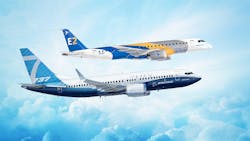Boeing-Embraer Venture Faces Extended EU Probe
The European Union’s competition-regulating body will deliver a preliminary ruling next week on the pending combination of Boeing Co. and Embraer’s commercial aircraft division, a $4.2-billion joint-venture deal that has been approved by shareholders of both companies and has been on-track for finalization by the end of this year. However, according to Embraer the inquiry may continue longer than expected.
The venture has been approved by shareholders of both partners. It will be 80% controlled by Boeing and 20% by Embraer.
The European Commission, the EU’s antitrust unit, will make its report on the combination on October 4, but according to Embraer the EC has indicated it will initiate a more in-depth (Phase 2) investigation that could take up to five months, extending the scheduled closing date into Q1 2020, or later.
“If and when Phase 2 is confirmed, the company will evaluate the potential impact on the estimated timeline for the closing of the transaction, which was originally tentatively estimated to occur by the end of 2019.”
According to an earlier published report, the EC has been questioning Boeing and Embraer suppliers and rivals about the scope of competition in the commercial aircraft market.
Reportedly, Boeing has said it was working with regulatory authorities in Europe and elsewhere to secure the relevant regulatory clearances.
Boeing Brasil - Commercial (as Boeing has named the joint venture) would serve the commercial aircraft “mid-market,” meaning regional jets or narrow-body aircraft for 70-150 passengers. This would include the Embraer E-Series and newer E-Jet E2 twin-engine narrow-body jets. Boeing’s current twin-engine narrow-body aircraft, the 737 series, is not in competition with the Embraer jets, but is ensnared in an ongoing safety review and currently idled worldwide.
Boeing initiated the Embraer takeover after its rival Airbus executed a takeover of the Bombardier C Series program (now called the Airbus 220 series). The Embraer E-Series and E-Jet programs compete with the A220, but both Boeing and Airbus have been driven by the increased competition for market share.
